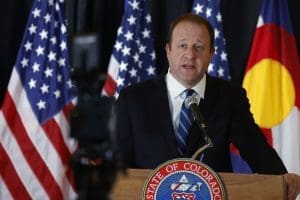First openly gay governor slams FDA's 'discriminatory' ban on blood donations
Colorado Gov. Jared Polis said the policy isn’t doing anything to protect public health.

Colorado Gov. Jared Polis, the country’s first openly gay governor, said on Thursday that the Food and Drug Administration’s policy on blood donations was “discriminatory” toward gay and bisexual men.
“There’s really no health justification for this discriminatory policy,” Polis said during a virtual town hall on the pandemic’s effects on the LGBTQ community. “Gay Americans and bi Americans, like so many others, want to help out fellow Americans. And if we can do it by donating blood, if we can do that by donating plasma if we have COVID-19 antibodies, it’s really shortsighted of any kind of policy to stand in the way of [that].”
Attorneys general from 20 states sent a letter to Health and Human Services officials just last month urging them to ease the policy and citing what the American Red Cross has described as a “severe blood shortage” caused by social distancing safety measures intended to prevent further spread of the coronavirus.
“In really good times we may have five days of inventory available for our hospital clients and now we’re running at a day or day-and-a-half in some cases,” one official told NPR.
The FDA recently updated its policy on donations for men who have sex with other men, which previously required them to abstain from sex for a year if they wanted to give blood. On April 2, that timeline was reduced to three months.
The agency also changed the one year waiting period for female donors who have had sex with those men to three months of celibacy.
Guidelines for transgender people are even more confusing and have often led to discrimination against them.
The FDA first imposed the donation policy during the HIV/AIDS epidemic of the 1980s. Men who’d had sex with another man after 1977 were considered ineligible to donate blood.
It wasn’t until 2014 that the FDA changed the policy to allow gay and bi men to donate if they had been celibate for one year.
The Human Rights Campaign has said that it opposes the current policy because it rejects people based off of membership in a group instead of on risky behavior.
“For example, a man who has had protected oral sex with another man once in the 3 months currently barred from donating blood. Yet a woman who has had unprotected sex with multiple partners over the same time frame with no knowledge of their personal histories remains in the donor pool,” the Human Rights Campaign has said.
During Thursday’s virtual town hall, Susan Talamantes Eggman, a Democratic state assemblywoman from California, said the changing timeline showed that the policy was outdated. She said the pandemic had also demonstrated why it needed to be eliminated immediately.
“With the nationwide blood shortage we’re facing, it becomes more and more ridiculous to people, and I think it also helped the public become more aware of it,” she said.
“The LGBTQ community has been aware for a long time about these restrictions but I don’t know that larger public has been, so I think the more conversations we have about this the more people will say, ‘Well that’s not right.'”
In 2016, when Polis was a member of Congress, he worked with Reps. Mike Quigley, Debbie Wasserman Schultz, Barbara Lee, Diana DeGette, and Alcee Hastings to urge the FDA to change its stance on donations.
A few days after the mass shooting at the Pulse nightclub in Orlando, which left 49 people dead, the representatives wrote a letter to the FDA commissioner asking him to end the policy.
“Given the target, nature and timing of this particular attack, the LGBT community is especially eager to contribute to the response effort,” they wrote. “… We are concerned that the 12-month deferral policy, which suggests that the sexual relationships of [men who have sex with men] and transgender women inherently pose a risk of HIV transmission, furthers a stigma that we have persistently fought to eliminate.”
In April, more than 500 health professionals signed an open letter that similarly advised the FDA to get rid of the policy entirely.
“Banning men from blood donation for at least a year since their most recent sexual encounter with a man is unscientific and based on outdated antibody-based HIV testing algorithms,” they wrote. “Fortunately, we can reliably test for HIV using antigen-based assays and maintain the safety of the U.S. blood supply.”
Published with permission of The American Independent Foundation.
Recommended

Ohio doctors fear effects of emergency abortion care case set to go before U.S. Supreme Court
A federal law that allows emergency departments to treat patients without regard to their ability to pay will be under U.S. Supreme Court scrutiny this week, and Ohio doctors are concerned about the case’s local impact on emergency abortion care.
By Susan Tebben, Ohio Capital Journal - April 23, 2024
House GOP votes to end flu, whooping cough vaccine rules for foster and adoptive families
A bill to eliminate flu and whooping cough vaccine requirements for adoptive and foster families caring for babies and medically fragile kids is heading to the governor’s desk.
By Anita Wadhwani, Tennessee Lookout - March 26, 2024
U.S. House Speaker Johnson says IVF should be protected — just not by Congress
U.S. House Speaker Mike Johnson said Thursday that it’s up to states and not Congress to preserve access to in vitro fertilization, weighing in on a growing national debate and campaign issue.
By Jennifer Shutt, States Newsroom - March 14, 2024








































































